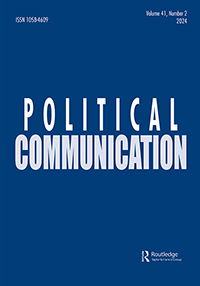Recognition Crisis: Coming to Terms with Identity, Attention and Political Communication in the Twenty-First Century
IF 5.1
1区 社会学
Q1 COMMUNICATION
引用次数: 1
Abstract
ABSTRACT The theory of recognition has much to offer the field of political communication as it struggles to comprehend communicative dysfunctions, political polarization and governing crises across the industrialized democracies. Drawing on the work of Axel Honneth, Charles Taylor, Nancy Fraser and Michele Lamont, as well as more recent contributions, we put recognition theory into conversation with some of our field’s contemporary concerns. In particular, we show how the theory offers depth, nuance and synthesis to progress communication scholars are making in the study of how attention economics and social identity shape perceptions and communications in a hybrid political media system. In the process, we argue that we are experiencing a historically novel phase of recognition, in which the granting and denial of recognition are transformed at the individual level by the affordances of many-to-many social networking platforms, and at the group level by the use of recognition for attracting attention to commodified media properties. At the intersection of the modern attention economy, heightened articulation of identity-based messaging, and recognition processes is what we term a recognition crisis, in which claims of misrecognition by multiple, conflictual groups are unresolvable and undermine the solidarity that grounds social and political life. We conclude with a roadmap of new opportunities to understand existing research findings and pose new research questions. Moreover, we show that the field of political communication has a great deal to offer discussions of recognition occurring in related fields of the social sciences.认知危机:21世纪的认同、关注与政治传播
承认理论在政治传播领域有很大的作用,因为它很难理解工业化民主国家的沟通障碍、政治两极分化和治理危机。根据Axel Honneth、Charles Taylor、Nancy Fraser和Michele Lamont的工作,以及最近的贡献,我们将认知理论与我们领域的一些当代关注点进行了对话。特别是,我们展示了该理论如何为传播学者在研究注意力经济学和社会身份如何在混合政治媒体系统中塑造感知和传播方面取得的进展提供深度、细微差别和综合。在这个过程中,我们认为,我们正在经历一个历史上新颖的认可阶段,在这个阶段,通过多对多社交网络平台的可供性,在个人层面上,通过利用认可来吸引人们对商品化媒体属性的关注,来改变对认可的给予和拒绝。在现代注意力经济的交叉点上,基于身份的信息传递和识别过程的高度表达是我们所说的识别危机,在这种危机中,多个冲突群体的错误识别是无法解决的,并破坏了社会和政治生活的团结。最后,我们提出了一个新的机会路线图,以了解现有的研究结果并提出新的研究问题。此外,我们还表明,政治传播领域在社会科学的相关领域中有很多值得讨论的问题。
本文章由计算机程序翻译,如有差异,请以英文原文为准。
求助全文
约1分钟内获得全文
求助全文
来源期刊

Political Communication
Multiple-
CiteScore
13.90
自引率
2.70%
发文量
30
期刊介绍:
Political Communication is a quarterly international journal showcasing state-of-the-art, theory-driven empirical research at the nexus of politics and communication. Its broad scope addresses swiftly evolving dynamics and urgent policy considerations globally. The journal embraces diverse research methodologies and analytical perspectives aimed at advancing comprehension of political communication practices, processes, content, effects, and policy implications. Regular symposium issues delve deeply into key thematic areas.
 求助内容:
求助内容: 应助结果提醒方式:
应助结果提醒方式:


